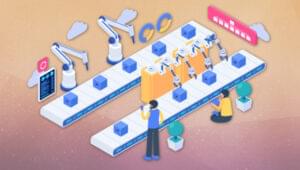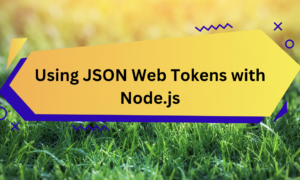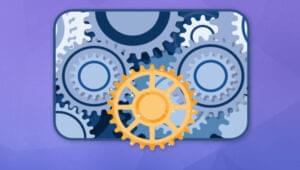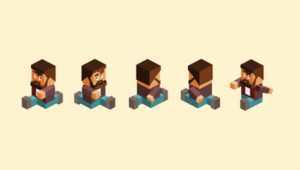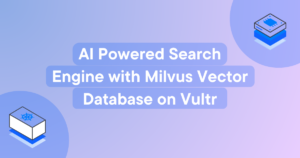Kevin Yank is author, editor, programmer, and artist in one. He’s a Canadian ex-pat battling the lack of Twizzlers in Melbourne, Australia, and has big plans for his future with SitePoint.com
I recently sat down with Kevin in an effort to find out a little more about the man…
SP: Hey Kevin. Thanks for taking the time to do this interview. I guess it’s no surprise to you that many people see you as a “god” in many ways. You’ve written the hit book “Build Your Own Database Driven Website Using PHP & MySQL“, which has caused ripples across the SitePoint globe. I want to get into some detail about that book a little later on, but first, can you tell us how you got involved with SitePoint?
I actually owe my presence at SitePoint to another Webmaster community! In 1998, when I took on my first “real” Web design job (an intranet site for Alcan Aluminium), the choice of HTML editor came down to the brand new (at the time) HotDog Professional 5.0 from Sausage Software, or Allaire’s Homesite 4.0.
Back then, Homesite was fairly buggy and HotDog was shiny and new, so that’s where I put my money. Sausage Software had a great online forum system for their product support (which has since grown into quite a lively community), and I joined in with my usual zeal. Within a year, I had become a moderator on the forums and was writing my first articles on Web development.
When a few members of the staff at Sausage Software broke away to launch a new site called SitePoint with the help of Matt Mickiewicz, I was on the list of people they wanted aboard this new venture.
It’s a long-standing cliché in the business world, but getting a job really is about who you know. Participating in a peer forum like the SitePoint Community (and maybe even publishing an article or two) is a great way to get noticed.
SP: Do you have any early experiences that you can point to that really “indoctrinated” you into the SitePoint culture?
I remember, on my second visit to the SitePoint offices, Jason had just set up a Perl-based MP3 Jukebox in the office. As soon as the novelty wore off, the jukebox became the subject of a hack-off between Jules and Jase, where each of them tried to outdo the other’s attempts at secretly making the server play only his favourite selections!
SP: As Mecca is to Muslims, and Jerusalem to the Jews, Melbourne, Australia is to Web developers. You recently made that pilgrimage to the shining city in the south and I’d like to know how you’re adapting?
Having lived for three years in Newcastle, New South Wales (near Sydney), the culture shock hasn’t been as severe as it might have been. I’m happy to report that I’m well into the process of selecting an Aussie Rules team to support (I suspect Mark might give me a pay raise if I chose the Western Bulldogs…).
The very best part of living in Melbourne is that whenever you miss a deadline you can say, “Oh, I thought you meant American Eastern Standard Time!”
SP: Is the SitePoint staff putting you through Rookie initiation rites?
Hey, I’m hardly considered a rookie! Don’t you go giving them any ideas, now…
SP: Have you had Vegemite or Tim Tams yet, and if so, can you describe the experience?
Tim Tams are the greatest! I have a tray of the new chewy caramel ones waiting for me in my refrigerator when I get home. Mmm! But, good as they are, they’re no substitute for Strawberry Twizzlers. Why can’t I get red liquorice in Australia? Is there a trade embargo or something?!
As for Vegemite, I’ve steered well clear of that stuff. I mean c’mon! Did Australians really need another yeast-based beverage (warning: obnoxious music on this page)?
On Technology
SP: We’ve seen you write some incredibly diverse articles for the SitePoint Network on languages other than PHP, including ASP.NET and JSP. When speaking of programming languages, where do you feel your strengths lie?
One of my favourite subjects in university was a course called “Programming Languages and Paradigms”. Although the course used Scheme and Java as programming languages, the focus was on the root concepts that lie at the core of all programming lages.
My point is that the better you understand programming languages in general, the easier it is to learn new ones. I’d say that’s where my real strength lies.
SP: In a similar vein, when you work on projects, do you tend toward one language, and if so, why?
To a developer like myself, programming languages are like tools. Asking a developer whether he tends towards one language is like asking a carpenter whether he tends towards one of his tools.
I suppose I currently enjoy working in Java the most, but I try to keep my choice of language for any given project based only on the suitability of that language for the task.
SP: Some PHP developers tend to compare ASP.NET with PHP and get confused about capabilities of the .NET framework. Do you care to chime in on this?
PHP is a server-side scripting language. ASP.NET is an object-oriented framework for Web application development. By its very nature, PHP is better suited to small-to-medium Web scripting tasks, while ASP.NET is better suited to enterprise-level Web applications.
That said, if you know and are comfortable with PHP, and it’s able to consistently meet your needs, then you need not worry about ASP.NET.
SP: Do you prefer .NET or J2EE? Why?
I love the platform independence of J2EE, and for that reason it remains my first choice and recommendation for enterprise Web development. The .NET Framework is easier for developers to use, and more highly adapted to some of today’s common Web application development problems. If the next version of J2EE doesn’t up the ante in this area before the Mono Project produces something usable, my preference might switch in the near future.
SP: Tell us about Editize. What is it? Why did you write it? And why should I, the common developer, use it?
Oh I see. Shameless plug time, is it? Well if you insist… Editize was originally called “The Octopus Editor”, and was created as a way to save our then-new editor, Georgina, from succumbing to carpal tunnel syndrome. In truth, I just felt guilty about sending her my articles in Word format with a bazillion inline code fragments that she would have to go through and tag by hand!
The first version was a real hit around the office, and our designers immediately saw the value it would add to some of our Web design clients’ sites. “If we had a tool like this to offer all our clients,” they reasoned, “we’d have a competitive advantage when bidding against other design firms!” So I began work on a more generalized version that produced HTML code instead of our own proprietary tag language; this product was dubbed RapidEdit.
From the reaction of our first client, we knew we were onto a winner. Releasing it to the developer community was the next logical step. Now you can get the same competitive advantage over other Web design firms that our designers have enjoyed. Just don’t bid against us on a project, okay?
The Book
SP: Now let’s talk about “the book”. “Build Your Own Database Driven Website Using PHP & MySQL” is a hugely popular tome of knowledge that has successfully kickstarted many a PHP developer’s career. My first question about this is… do you realize just how much trouble you’ve caused?
Why, whatever do you mean…? Actually, around the office, we like to joke that the book gives readers just enough rope to hang themselves with! Wherever possible in the book I try to insist on good programming practice, but readers tend to get so excited about what the book lets them do that they sometimes skip right over important chapters like “Relational Database Design”. I’ve seen some pretty ugly database layouts in my email inbox since the publication of the book!
SP: Do you plan to release a revised edition that takes into account changes in PHP such as register_globals being disabled?
Definitely. A revised edition of the book is what I plan to focus my energies on next month.
SP: How many questions do you get on an average day regarding the book?
It’s come way down thanks to Tom Rutter, better known as MMJ to the SitePoint Forums audience. He’s recently taken over answering support emails about the book and Editize. I only get one or two a day in my personal inbox these days.
SP: If there’s one question you answer all the time and you’d like to give a once-and-for-all answer to, what would it be?
No I do not want to know how I can make $500,000 a year selling Viagra from my home! Thanks for asking!
SP: You’re also co-editor of a PHP book released by Wrox Press. How did this work? Did you have a particular section you worked on? How did you land that gig?
I’ve actually served as technical editor on several Wrox titles, “Beginning PHP4” and “Professional PHP4” among them. Basically what would happen is the lead editor of the book would send me draft chapters that had been submitted by the various authors for the book. I’d have a few days to rip each of these submissions to shreds for technical clarity, accuracy, and questionable parentage.
My comments would then go back to the author, who would re-work the chapter to fix the problems identified by my review before the chapter was sent to the general editors, who would clean up things like spelling and grammar.
The job came out of my original work on the PHP/MySQL article series that became my book. Someone at Wrox noticed my expertise in the field and asked if I’d be interested in doing some work as a technical reviewer. It was fun seeing my name in the credits of a “real” technical book, but I’ve since quit editing for Wrox to make time for other priorities.
Getting Personal
SP: Is Kevin Yank really one person or a super-team of writers all working together under a fictitious writer’s ghost name?
That is incorrect. Kevin Yank is actually the designation of a highly sophisticated, symmetrical multiprocessing AI running on a box in the corner of SitePoint HQ (right next to the MP3 server). I also make coffee.
SP: Let’s talk about some personal things, if you don’t mind. What’s a typical day look like for you?
A typical day used to begin with me rolling out of bed around 10:30AM and checking my email in my housecoat. Working remotely from home had its perks!
But now that I’m at the SitePoint offices it’s a 7:30AM start for me every day. After typical morning stuff, a 15 minute stroll up blustery Hoddle St. sees me at work shortly after 9AM.
I’ll usually lunch at the office, but I like to meet my friend Archie (of Sausage Software fame) for lunch downtown about once a week. I’m also planning on starting a drawing course at the Centre for Adult Education (CAE) in Melbourne on Wednesday mornings. Got to get those extracurriculars in!
After a long day of tweaking Java code and answering interview questions, I walk home around 6PM. My evenings are usually filled with movies (I’m putting together a sweet DVD setup at home), company, or quiet reading.
SP: What are some of your interests apart from Web development and SitePoint?
As mentioned above I’ve always been a bit of an artiste. I used to spend countless hours in class drawing comic books instead of paying attention. In the past few years I’ve let my skills in that area stagnate somewhat, and I look forward to picking it up again soon.
I’ve also got quite a nice kitchen in my new apartment, which I (perhaps over-ambitiously) hope will bring out the cook in me. I’ve already had a few people over for dinner to try some of my (admittedly simple) creations, which was a lot of fun!
SP: Where do you see the Internet in 3 years?
I think the Web on the desktop will change relatively little except to continue to migrate towards higher bandwidth applications as home Internet connections move in the same direction.
Where the real progress will be is in the ways the Internet will begin to slowly insinuate itself into our everyday lives away from our desks. Internet-connected handhelds and mobile phones are still wrestling to be something other than portable desktops with really small screens, but I think over the coming years we’ll see them start to become truly useful, helpful devices.
I’m thinking of an in-dash display that shows available parking spaces in the neighbourhood; a store with no checkout counter, where the shelves are stocked with samples of the products you can order and have delivered to your door that same day; and a personal music player that lets you play any song at any time for a reasonable monthly subscription fee.
SP: Do you have any favorite movies?
Many. My DVD collection grows by an average of 4 titles a month. Particular favourites include the Back to the Future series, Shrek, Jerry Maguire, Waking Ned Devine, and Groundhog Day. Oh and yes, I am a Star Trek fan.
SP: The women in our group want to know if you’re single and if you are, are you available?
I am very much both.
SP: What would you like to see yourself accomplish, I.T. or otherwise?
Assuming my cooking skills improve with practice, I’d like to run an online comic book, go skydiving, see more of Europe, and go camping at least once a year.
SP: Do you think that marveling at the term “PHP god” could be considered blasphemy and lower your chances of admittance into a preferable afterlife?
Nah, I think everyone knows that God is the l33test PHP coder there is.
The Future
SP: Back to programming, where do you go when you need help in programming?
Writing book reviews as part of my work has seen me blessed with an extensive reference library to draw on, so that definitely helps. Failing that, I tend to browse the support forums, newsgroups, and other online resources just like anybody else. When I’m really stuck and can afford to drop a few bucks for a quick answer, I’ve found HotDispatch.com to be an excellent place to turn.
SP: What do you see as major hurdles for PHP to overcome in the next 5 years?
PHP is entering a big growth phase due to the surge in popularity it saw with the release of PHP 4.0. Suddenly every man and his dog is a PHP coder, and has an idea about how to make PHP better. PHP’s biggest challenge will be to avoid the creeping featurism that comes with this popularity.
The PHP development team will need to work hard to keep PHP simple and easy to learn, or risk losing what has made PHP popular and useful to begin with.
SP: What advice would you give young programmers trying to forge a career for themselves?
Practice, practice, practice. So many budding developers whine that they can’t get work because everyone wants experience. Well just as an artist can’t expect his first painting to be a lucrative, commissioned work, a programmer must build a few projects purely for the sake of gaining experience before he or she can expect to be hired.
Before my first paid programming gig (writing an LDAP directory import module in Java for Gemplus), I wrote a number of little programs for my own use. My earliest GUI program was a wrapper for a command-line music (MOD) file player. Then I wrote my first flat-file database for an email tagline manager. Deciding I needed to learn a little cryptography, I wrote a personal diary program that used a Java Cryptography Extension (JCE) compliant library to protect the contents of diary entries.
For Web development, it’s even easier! There are always not-for-profit organizations, friends of friends, and other acquaintances in need of Websites who don’t have the money to spend on a professional designer/developer. And if all else fails, you can just build the fanciest personal Website you know how.
The name of the game is to stay busy. Trade your services for free software, hosting, or whatever you can, but even if you have to work for nothing, remember that the real value of this early work is to build a portfolio for yourself. Next thing you know, you’ll be able to walk into an interview with 2 years’ experience under your belt.
SP: Finally, inquiring minds have to know… what do you think about the current state of the Danish dairy market in relation to the rise in number of global PHP users?
The hordes of PHP-coding Danish cows, who no longer need to produce milk to survive weigh heavily on my conscience every day. But it’s better than having them turn to a life of cyber crime! I say let’s all drink soy and be merry!
Aaron Brazell is the senior technology manager for b5media, a new media network. He is a well known and respected voice in the world of blogging and social media and has a passion for written communication. He has been developing in PHP for six years and has been actively involved with WordPress for nearly three years. He writes on his blog, Technosailor and is available for WordPress consulting






















